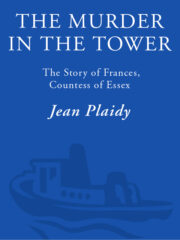As soon as this solemn ceremony was over it was the signal for the pageantry to begin; and in one of the rooms of the Palace several young women were chattering excitedly as they awaited their cue to take their places.
These were reckoned to be the loveliest of the Court ladies and it had been decided that each should represent a river of England. Among them was one, much younger than the others and more vivacious; this was the fourteen-year-old Countess of Essex.
Frances had plagued her parents until they allowed her to come to Court; though fourteen, she reminded them she was a married woman and, having glimpsed something of the excitements of Court life, she would be driven mad by melancholy if she were forced to spend many more days in the country.
Her father, the Earl of Suffolk, was indulgent. Poor Frances, she was much too gay to be expected to sulk in the country. Let her come. His wife was agreeable. She herself had matured early and believed this would be the case with Frances. The child was safely married, even though her marriage had not been consummated and her husband was far from home. Let her come to Court.
Thus the nymph of the River Lea took her place among the others, and secretly she was delighted because she knew that she could attract attention even among such beauties.
She studied them dispassionately. Were they such beauties? There was the Lady Arabella Stuart—a very important lady, it was true. But she’s quite ancient! thought Frances. She must be thirty-five. Thirty-five and unmarried! Poor Arabella Stuart, whom the King watched constantly and did not like much because of her nearness to the throne. There had been plots involving her, and James would never allow her to have a husband.
I wouldn’t change places with Arabella Stuart, royal though she may be, thought Frances. Arabella on this occasion was the nymph of the Trent. She was preoccupied, and Frances had heard it whispered that she was in love with William Seymour and determined not to lose him, in spite of the fact that the King would certainly forbid the match.
Frances shrugged aside the affairs of that ancient one. Those of Frances Howard were—or soon would be—far more interesting.
There was no one so beautiful as she was. Certainly not Elizabeth Grey—the nymph of the Medway because she was the daughter of the Earl of Kent—nor the Countess of Arundel—nymph of Arun. There was one though who was attracting most attention, and that was the Princess Elizabeth, who represented the Thames.
But that is only because she is the King’s daughter, Frances told herself scornfully.
The Lady Anne Clifford had noticed Frances pirouetting this way and that and came over to her smiling.
“It is your first Court occasion,” she said.
“How did you know.”
“You are so excited.”
Frances clasped her hands. “Is it not wonderful to be at Court?”
Anne laughed and said: “Take care. You are too young to come to Court.”
“I am fourteen.”
“So young? I had thought you a little older.”
Frances was delighted. “It is such a handicap to seem a child!”
“You must be watchful. There are people at Court who would be ready to take advantage of one so young.”
“What people?”
“Men.”
Frances laughed scornfully. “I shall be the one to take advantage of them.”
Several of the ladies laughed, and agreed that there was something about the nymph of Lea to suggest that she would take care of herself.
In the great hall beautiful scenery had been set up; there were to be several scenes, and the first represented Milford Haven and the arrival of Henry VII. Songs, written by the poets especially for the occasion, were sung, extolling the beauties of the rivers; and all the nymphs were mentioned in turn as they took their places in the dance.
Frances was intoxicated with happiness.
“The beauteous nymph of crystal streaming Lea …” sang the musicians and for one moment everyone in that great hall was looking toward Frances Howard.
Too soon the charm of Anne Clifford, the nymph of Aire, was being acclaimed, but the words about the nymph of Lea went on and on in Frances’s mind.
As she danced with the others after the fashion which they had practiced together, she tried to get as near as possible to that spot where the Prince sat beside his father.
He too had become older since she had last seen him; he was no longer a boy.
He had noticed her, she was sure of it. Every time she took a sly look at him, he was watching.
This is the happiest moment of my life … so far, Frances told herself.
Anne, the Queen, assured those surrounding her that it was the happiest of hers, for now the nymphs had stood aside and little Zephyr had appeared. His green satin robe was decorated with gold flowers, and wings made of silver lawn were attached to his back. A wreath of flowers had been placed on his flowing hair and Anne’s eyes sought the valuable diamond bracelet which she had put on his little arm when she went to see him being dressed.


"The Murder in the Tower: The Story of Frances, Countess of Essex" отзывы
Отзывы читателей о книге "The Murder in the Tower: The Story of Frances, Countess of Essex". Читайте комментарии и мнения людей о произведении.
Понравилась книга? Поделитесь впечатлениями - оставьте Ваш отзыв и расскажите о книге "The Murder in the Tower: The Story of Frances, Countess of Essex" друзьям в соцсетях.